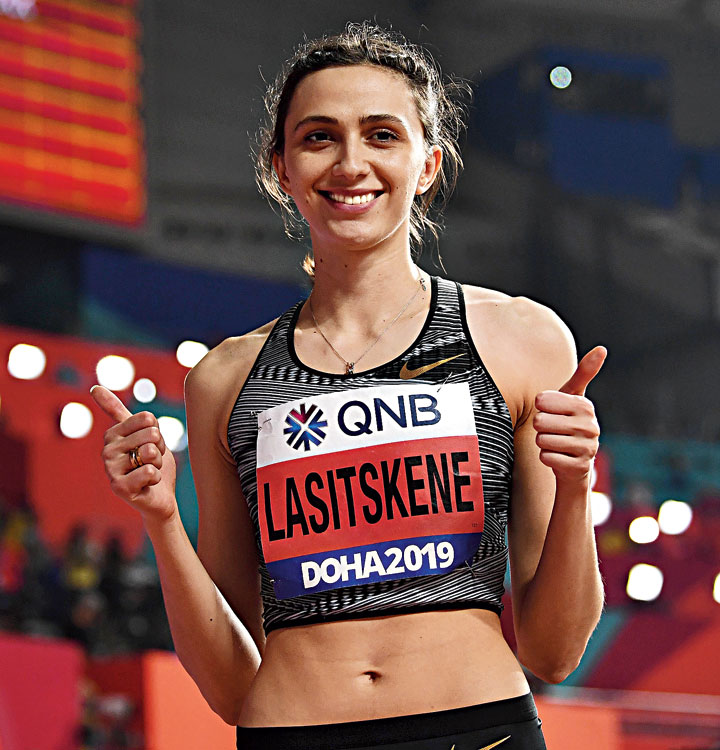For many people, the high point of mega sport events is not the action but the medal presentation ceremony soaked in national anthem and national flag. It is the traditional raison d’etre for competing at those levels.
Nation is the ecosystem that groomed you. It brought you up and upon winning, payback commences with a ceremony that pays tribute to the community and ecosystem that reached you this far. To be precise, the payback starts before the podium, on the track, where the first instinct of anyone breasting the tape is to wrap up in a flag and pose for the cameras.
Amid such celebrations at the 2019 IAAF World Athletics Championships which ended in Doha on Sunday, a few athletes stood out. The practice of Authorised Neutral Athlete (ANA) began with the 2017 World Championships held in London. It was a fallout of the 2013-2014 doping scandal, a media exposé that blew the lids off a system within Russia that supplied banned substances to the country’s elite athletes, allegedly with officials in the know.
In November 2015, the International Association of Athletics Federations (IAAF) — the apex body in world athletics — voted in favour of banning Russia from track and field events. At the same time, not all athletes are tainted and Russia is a powerhouse in sports. It is unjust to shut out all their athletes because of the fault of some.
Enter ANA. The ANA category picked up quite a few medals at the 2019 World Athletics Championships in Doha. The most famous face of the lot was perhaps the enigmatic high jumper, Mariya Lasitskene, who was crowned world champion for the third time. Her victory lap in the stadium stayed in mind for the absence of a national flag; it was just an athlete waving and thanking spectators.
The Washington Post reported that at her medal presentation ceremony, the Russian national anthem won’t play. For a proper taste of what this means — imagine neither national flag nor anthem permitted for Qatari high jumper Mutaz Essa Barshim, who successfully defended his world title amid thunderous applause in the stadium. What if Barshim un-belonged like Lasitskene? The story doesn’t end there.
On the medals table, every country that won a piece of metal at the Championships finds mention. I couldn’t find a column for the ANA athletes. I don’t know if refugee athletes are treated similarly but this much seemed clear — ANA are the ghosts of sport. They are highly accomplished yet non-existent.
The reason ANA engages so much is because of the multiple scenarios that emerge if sport was replaced by other human traits. As mentioned, it was the allegation of officially sanctioned doping machinery in Russia and its subsequent ban, which gave birth to ANA. Sport has always aspired to stay neutral. That is why the world makes provisions for ANA and refugee athletes. It is possible that neutrality aside, at a personal level an ANA athlete may disagree with what his/her country did and thereby denied them the chance to represent their nation.
It is also possible that like Dutch athlete Sifan Hassan’s claim of the public criticism she endured for having coached with Alberto Salazar, fuelling her phenomenal 1,500m race at the World Championships, the ANA athletes, devoid of glamour by nationality and crowd support, may be channelizing their island existence into gritty performances.
Who knows? Whatever the wellspring of their drive, they have proved that un-belonging isn’t invitation to fade out and die. You can survive, even win. The larger question therefore resident in the ANA tag is whether you can consciously choose to not belong.
The question is valid because increasingly people around the world find themselves under governments and regimes they don’t completely agree with. The nationality/ nationalism argument typically triumphs riding the bogey that you are feeding off a common, shared support structure and therefore payback matters. That is absolutely right.
But when the stance becomes extreme it is as good as replacing your brain with your stomach. It will be a very different world if sport, music, art and literature were authored by the stomach and the brain worried of nothing but money and means to feed.
As yet we have reached only ANA. If the political trends currently seen on the planet persist, we may not be far from the days when at least some embrace an authorized neutral existence. They won’t play an anthem for you, they won’t give you a flag to drape yourself in and you won’t be mentioned in accolades, eulogies and hagiographies. You will be the ghost of the human realm, belonging nowhere and everywhere.











